

LEADERSHIP AND EMPOWERMENT SEMINAR – UP DILIMAN
by Andrew Ortega
What you are right now does not mean you are going to be the same person tomorrow. Not after a life and organization transforming seminar workshop held last August 11-13, 2017. The leadership and empowerment seminar/workshop was made possible by Brod Willie “Tatang” Vergara as Program Director and by Brod Alexis Dogwe, who provided the warmth and hospitality in a nice venue in Clark, Pampanga and various alumni donors.
The participants along with the speakers of the seminar/workshop went straight to business upon arrival. First to speak was Brod Dan Lachica who shared an inspiring testimony about personal change. Now a very successful Betan on the top of his field, Brod Dan Lachica told us that despite his storied past - how things went in a way no one wishes, how he stood up from all of these - he was able to make himself the best that he could be with God’s grace.
Coming from the corporate world and wishing to impart lessons and learnings, he
taught us the Balanced Scorecard. The Balanced Scorecard is a way to
strategically manage corporate and non-profit organizations. It makes use of
careful planning, prioritizing, goal setting, and execution. He spoke of how
such a seemingly very technical method used in the corporate world can also be
utilized in simple everyday life, in the university, in classes and most of all
in the fraternity. He explained how it can boost recruitment, solidify the
internal organization, work efficiently on events and projects, maximize profit
and proceed with a clear mindset. Lessons: What you are and where you are right
now might be brought upon by reasons beyond your control but what you are going
to be tomorrow will be a product of your own doing, a product of your day’s
work. Work hard, work smart and be productive today and you will be rewarded
promptly on what you have done. Do nothing but expect no reward tomorrow.
Brod Dave dela Torre, whom Brod Tatang fondly calls him by his moniker “Dirty
Dave”, took over after Brod Dan Lachica. Brod Dave, an international consultant,
followed Brod Dan’s train of thought. As process consultant, he would “not tell
the companies exactly what to do, but rather assist or facilitate them to
discover what needs to be done.” He therefore required active participation from
the participants, and began by asking us to fill up a table of projects and
events for the last three years, from 2014 to 2016.
After the activity, we were asked to go back to the time when those events were being planned and executed, and to reflect on them - to think of the time every single event or project was held, and to analyze if they were executed properly. Were they planned carefully? And if so, were they executed as planned? Were goals clear for each and every event and project? Were expectations met? Were goals achieved? These questions served as a wakeup call for us - that certain adjustments need to be done in the way we do things so we can cope with the challenges of the times. He then asked, “Given our current numbers and taking into consideration members of those Greek-letter organizations, can we really consider ourselves the fraternity of choice?” From the array of events and projects, which of these should we focus on to bring us closer to our desired state. It is much better to focus only on selected, impactful projects instead of spreading ourselves too thinly in so many endeavors requiring so much time, resources and energy. The saying that “less is more” applies in our quest for the UP Beta Sigma to be known and considered as the fraternity of choice. For us to address our problems and issues with recruitment, we must first acknowledge and accept ourselves that whatever it is we are doing, we could always do better, and from our mistakes and we can improve.
Our gratitude goes to Brod Dan Lachica for his inspirational message and to Brod
Dave de la Torre, who capped the first night with the introduction of the Key
Performance Index as a way of planning for the future and as a tool to track
performance over time. Both of them have gone out of their way to make time and
help address the problems of the residents.
The following day, the seminar was then led by Brod Willie “Tatang” Vergara. It
started at exactly 8:00 in the morning. At the beginning of his talk, he handed
out a piece of paper to everyone. He then asked them to write a rule to be
posted it in front. These rules would henceforth serve as simple guidelines for
the rest of the seminar/workshop.
For one to gain knowledge and wisdom, one must first acknowledge one needs to
empty his/her mind of preconceptions and biases. Brod Tatang narrated the story
of the Zen master and his student. The master continued to fill the cup with tea
even if it was full to illustrate that the student must first empty his/her mind
in order to learn.
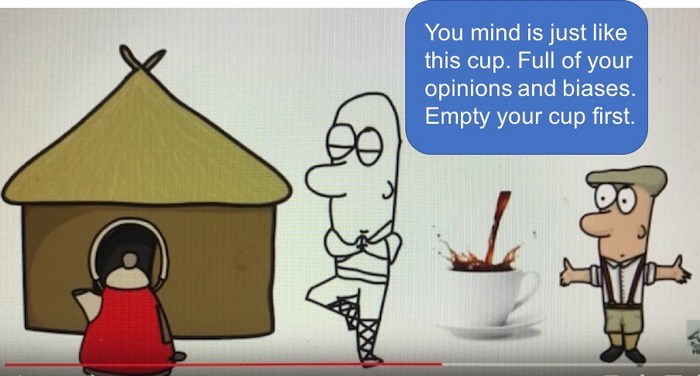
Next, the speaker emphasized that we are in the middle of a storm: diminishing
membership, parents getting even more averse about their children joining
fraternities, the UP administration becoming over-strict with fraternities, the
changing demographics within the university, and departure from the concept upon
which fraternities have originally been established. But to address these issues
we must first acknowledge that we really are in the middle of a storm. Can we
honestly call ourselves the fraternity of choice? We need to admit that a change
in mindset, personal and organizational credibility, creativity, focus, hard
work and good image are keys to survival. And with that Brod Willie Vergara
started the seminar with a prayer for success in the seminar/workshop, a prayer
meant “to disturb us” into the realities of this storm and to sail beyond our
comfort zones.
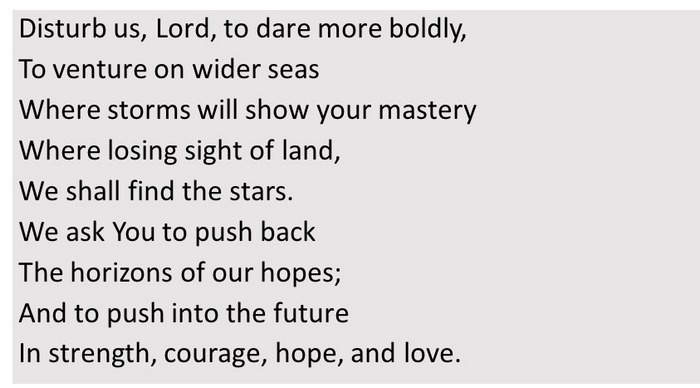
As discussed the night before, Brod Tatang laid down some possible take-outs. By
the send of the seminar, the participants are expected to gain further insights
into:
· Gaining control over one’s own life
· Doing everything with meaning and purpose
· Achieving goals more often in a shorter time
· Understanding the highest priorities and learning on how to achieve them
· The concept of effective communication
· Seeking 3rd alternatives and
· Achieving life balance
Brod Tatang emphasized that one’s character and personality are important
ingredients of success: Personality ethic being your public image, your
identity, the way one projects himself/herself to other people, while Character
ethic comprises of fairness, justice, integrity, modesty, temperance, hard work,
patience, honesty and most important of all, the Golden Rule - which is not
doing unto others what you don’t want others do unto you.
“The only thing that endures over time is the “law of the farm”. You must
prepare the ground, plant the seed, cultivate, and water if you expect to reap
the harvest.” --Stephen Covey
He stressed the fact that in life, there are no quick fixes. As discussed the previous night, what you are right now possibly may have been brought upon by things you have no control of. But what you are going to be tomorrow will be a product of your day’s hard work. One cannot cram on a farm. One cannot plant today and harvest tomorrow.
A lot have changed since then. What the fraternity was then may be a lot
different than what the fraternity is today. What the university then has
changed a lot today. Same thing with the mindset of students, our families, our
college professors, the UP administration, the Diliman community and maybe even
ourselves as members of the UP Beta Sigma Fraternity. With such changes, we need
to act accordingly.
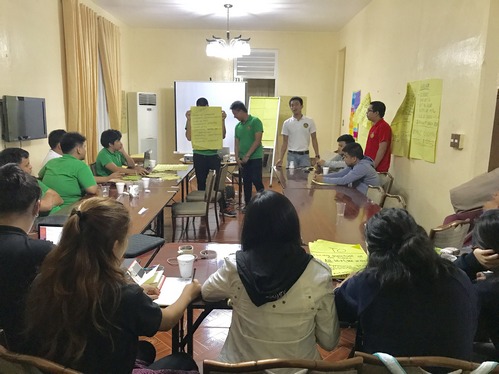
The idea of a growth mindset over a fixed mindset was introduced. People with
growth mindsets see failures as opportunities for growth, they are hungry for
success, always bringing themselves to a new level always higher than before. By
contrast, people with fixed mindsets, being faced with a difficult obstacle in
life, tend to give up, finding satisfaction at their current position and never
striving for more. People are not born with a fixed mindset or a growth mindset.
It always is within our choice, within our control which mindset we wish to live
with. People with fixed mindset can develop a growth mindset. But just wanting
it will never be enough. We must act, and act purposefully, with dedication and
with focus.
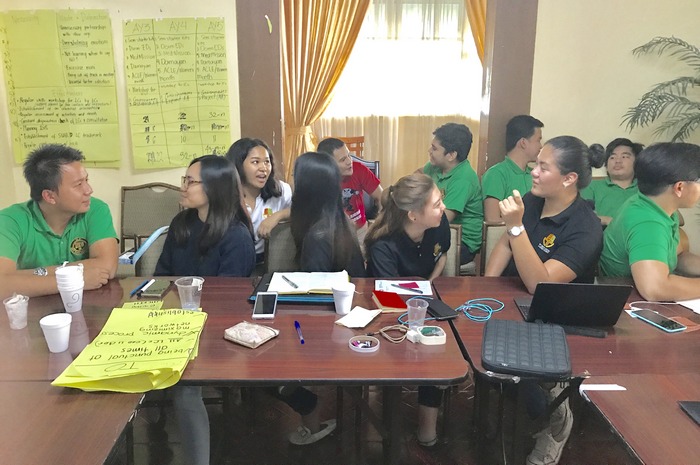
And with this train of thought, Brod Tatang brought upon the idea of paradigms.
Paradigms are more fundamental than attitudes and behavior. They influence the
way we see things, they are imbedded in our brain. With the many changes we are
continuously facing every day, a paradigm shift is of utmost importance. We need
fundamental changes in the way we approach things, in the way we project our
image on and off campus, in our approaches to recruitment, in the way we want
ourselves as UP Beta Sigma Fraternity to be known.
“Today’s significant problems cannot be solved at the level of thinking we were
at when we created them.” --Einstein
Small paradigm shifts in the way we do things won’t withstand the storm we are in. A principle centered paradigm is an ultimate necessity. We should always value the principles in our credo. “All that is good and noble in man.” “Fraternity Pin must be earned before it is worn.” “My actions must never stray in a direction that will cast dishonor upon the name of my fraternity, defy its traditions, nor lower the tone of its dignity.” We as a fraternity have time-honored principles of brotherhood, integrity, loyalty, equality and service to go by.
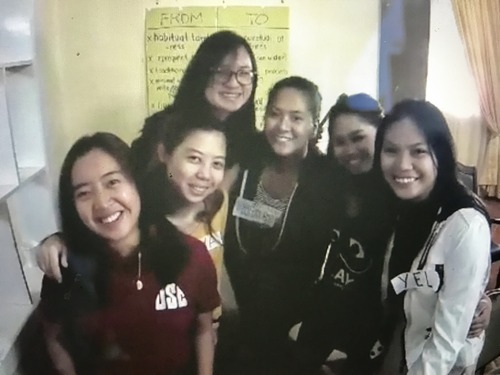
Brod Willie “Tatang” Vergara’s talk mainly revolved around the teachings of
Steven Covey. In his several books, he presents an approach to being effective
in attaining goals by aligning oneself to what he calls “the true north”. To
being focused in life, being clear in one’s mind what one wants to achieve in
life while being also clear what one should do to achieve these ends. The first
three habits in his book “7Habits” are all about moving from dependence to
independence.
Habit 1: Be Proactive. Being proactive is the contrast of being reactive or
passive. A proactive person creates or controls a situation by causing or making
something happen rather than responding to it after something has happened. A
proactive person differs in language from a reactive or passive person. A
proactive person will say things like: “I can.”, “I’m responsible.”, “I want
to.” while a reactive person acts in a negative way and would rather say things
like: “I can’t.”, “I have to.”, “There’s no other choice.” A proactive person
works to expand his center of influence and thereby resulting in contraction of
his center of concern. One must not sit and wait in reactive or passive mode.
One must not wait for problems to happen before taking action.
After discussing the first habit of very effective people, the participants were divided into 3 groups, one group composed the Ladies Corps, and the other 2 groups composed of brods. They were asked to spend several minutes to reflect and write paradigm shifts about what can be done proactively – as individuals and as a chapter. General conclusion: We have the POWER! The power to act according to what is “good and noble”.
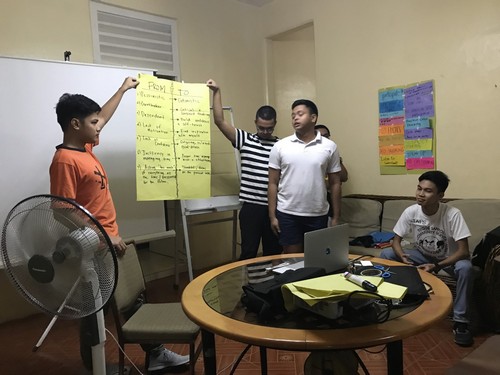
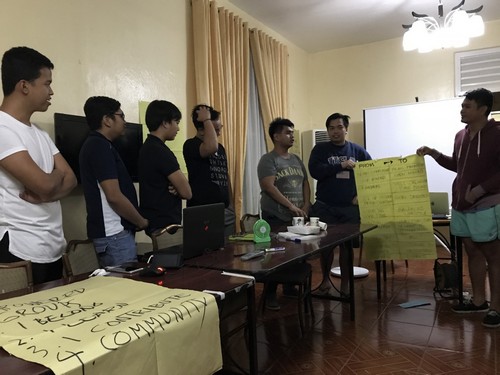
“All things are created twice, first mentally and then physically”. Habit 2: Begin with the End in Mind was discussed. The second habit tackles one’s mission and vision in our different roles as members of our families, as students of the University, as members of the UP Beta Sigma Fraternity, as a future career man and as an alumnus. We were asked to write our mission/vision statement and use present tense as if the future is already within us. It should be ambitious but realizable and most of all stated in a positive and inspiring language. After the discussion, the participants were asked to write in a piece of paper their mission and vision in their own individual lives to serve as their personal guides and keep these for themselves.
After the day’s discussion, GP Patrick Diaz led the participants to. They were asked to lay down our Chapter’s vision for the next 5 years using the Key Performance Index, recruitment being the first of the KPIs. The participants were asked to tally how many new members can be recruited vis-a-vis proposed events and projects over a period of 5 years. The second night ended with an optimistic yet realistic conclusion: a range of 68 to 90 by the end of five academic years.
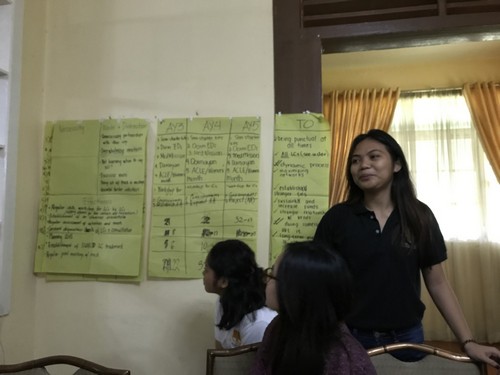
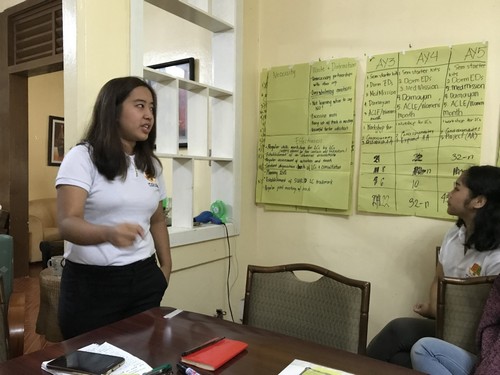
The last day of the workshop/seminar started at 9:00 a.m. with Habit 3: Put
First Things First. Following Covey’s method, Brod Tatang introduced the time
management matrix comprised four quadrants: urgent and important, important but
not urgent, urgent and not important, and lastly not urgent and not important.
The following quadrants were described respectively as follows: quadrant of
necessity, quadrant of effectiveness, quadrant of distraction, and lastly the
quadrant of waste. This method taught us the skill of prioritization, of knowing
what is most important. But how can one make time for more important things? One
just has to follow three simple steps. First, connect with one’s mission and
his/her roles.
Then, prioritize the BIG ROCKS (the most important things) first. Lastly,
execute accordingly and review how you are doing on a regular basis.
With the first three habits now established, one can now bridge the gap between
dependence and independence. To move towards the habits of interdependence,
another terminology was introduced: The Emotional Bank Account (EBA). Another
concept that was introduced earlier – The P/PC Balance – was discussed as
another component in the journey from independence towards interdependence.
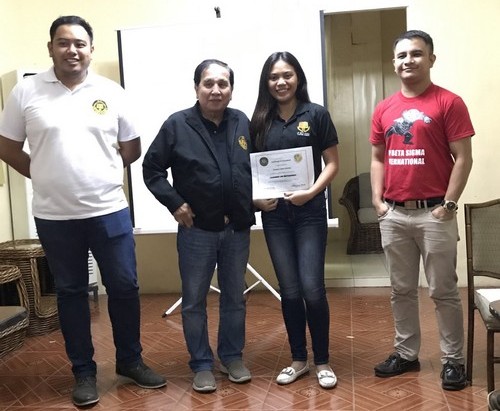
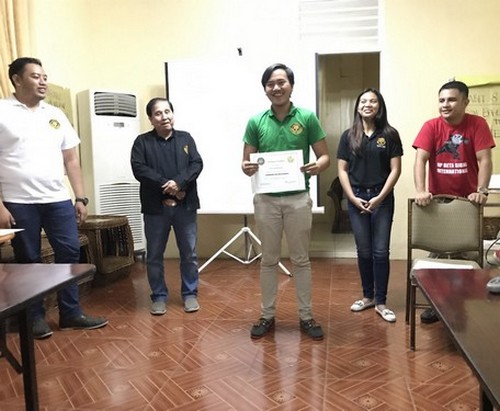
Habit 4: Think Win-Win started with an instructive game similar to an economics
concept called “The Prisoners’ Dilemma”. The participants were divided into two
groups - the Ladies Corps and the Brods. Much was learned from this game as both
groups failed to come up with an optimum result. It showed that without much
discussions and complete trust, groups could usually arrive at erroneous
conclusions.

The fifth habit is the habit of effective communication. Habit 5: Seek first to
understand, then to be understood. To listen with empathy is to listen and
respond to another person with mutual understanding and trust, to put yourself
in another person’s shoes. To understand, one must not probe, one must not
judge, one must not advise and one must not interpret. In empathetic listening
there are three simple magic words, “tell me more”. In getting oneself to be
understood, one must follow some simple guidelines such as follows: Ethos, one
should be of credible personality and of character; Logos, one should appeal to
logic and common sense; Pathos, one should appeal to a person’s emotion; and
Kairos, one must choose an opportune time and right place to sell one’s idea.

The sixth habit is the habit of synergy. Synergy is achieved when two or more
people work together to create a better solution than working alone separately.
Synergy is celebrating differences, it is teamwork, being open-minded and
finding new and better ways. It is not simply the tolerance of differences, or
working independently, thinking you are always right. It is not even arriving at
compromise. Rather, it is seeking the best option resulting in the advantage of
both parties. Practice of this habit is a result of valuing differences and
seeking third alternatives. Habits four, five and six are habits of
interdependence, habits that could help one to be truly effective in working
with other people.
The seventh habit is the habit of continuous improvement. Habit 7: Sharpen the
Saw. It aims to continuously improve both personal and intrapersonal spheres of
influence. Renewing oneself and as a fraternity in four dimensions - in body, in
mind, in heart and in spirit. Anchored upon principle centered leadership, Betan
Greatness, Personal Greatness and Leadership Greatness can be attained. To
conclude these two modules of Private and Public Victory, Brod Tatang showed us
a short animated video on Stephen Covey’s “Seven Habits of Highly Effective
People", followed by another video featuring Steven Covey himself – Habit 8:
From Effective to Greatness.
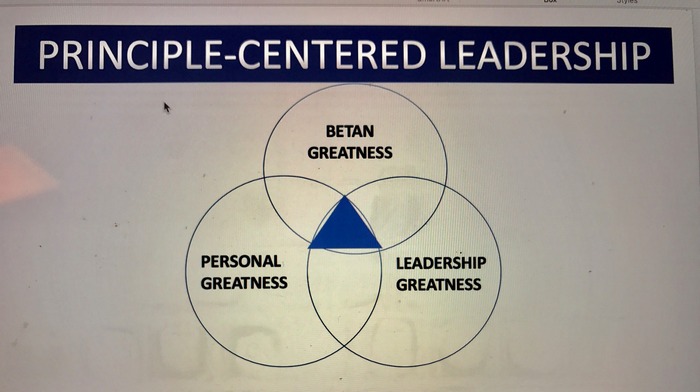
With that came the end of the 2-days-3-nights leadership seminar/workshop.
Special thanks to all who have made it possible, Brod Tatang for leading the
workshop/seminar, for all the wonderful ideas and lessons he has imparted upon
us, along with Brod Dan Lachica and Brod Dave dela Torre. We would also like to
extend our sincerest gratitude to Brod Alexis Dogwe for providing a place for
all of us to stay. To all the resident brods and members of the alumni who
participated in the leadership seminar/workshop.
As a resident member of the UP Beta Sigma Fraternity it is my duty to fulfill my
dues, to embark on this unending journey to seek knowledge and wisdom, to serve
the country, to serve my family, to serve the university and to serve our
beloved fraternity. I, myself, cannot thank you enough for everything. If they
could allow the participants to show them how grateful they are by practicing in
life what they have learned, and making the teachings become the guide of an
unending network of knowledge and basis for future actions.
Onwards to the Eighth Habit, to find your voice and inspire others to find
theirs.
Andrew Ortega
2016 B- Xiphos
(Back ---> Diliman Residents Updates)